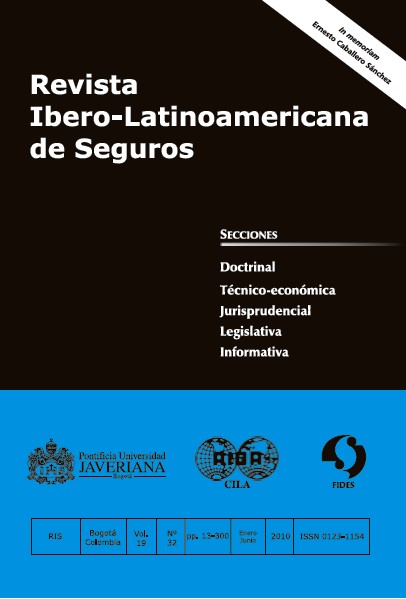Abstract
The official opinion with respect to the legal viability of a product in which an
insurance company agrees to grant a policy for guaranteeing a credit financial
entity against the default of its debtor, its contained in the Concept 1999002103-1 issued by the Colombian Superintendency of Banks, dated as of February 18th,1999. Pursuant to the aforementioned concept, insurance policies that cover debtor’s insolvency are prohibited in Colombia. In this paper we analyze the opinion of the Superintendency of Banks (currently, Financial Superintendency), taking into consideration the legislative background of credit insurance products in Colombia, to conclude that insurances guaranteeing debtor’s insolvency in credits granted by financial entities are legally permitted pursuant to Colombian Regulation.
In view of the above, we propose a comparative analysis of financial credit
insurance with respect to other products that are intended to protect creditors´
economic interests and that may be similar to the above-indicated insurance. In
such way, this paper aims to provide a general overview, in order to establish if
the proposed scope of the financial credit insurance may be addressed to attend
segments of the market currently unattended by the publicly available products.
This journal is registered under a Creative Commons Attribution 4.0 International Public License. Thus, this work may be reproduced, distributed, and publicly shared in digital format, as long as the names of the authors and Pontificia Universidad Javeriana are acknowledged. Others are allowed to quote, adapt, transform, auto-archive, republish, and create based on this material, for any purpose (even commercial ones), provided the authorship is duly acknowledged, a link to the original work is provided, and it is specified if changes have been made. Pontificia Universidad Javeriana does not hold the rights of published works and the authors are solely responsible for the contents of their works; they keep the moral, intellectual, privacy, and publicity rights.
Approving the intervention of the work (review, copy-editing, translation, layout) and the following outreach, are granted through an use license and not through an assignment of rights. This means the journal and Pontificia Universidad Javeriana cannot be held responsible for any ethical malpractice by the authors. As a consequence of the protection granted by the use license, the journal is not required to publish recantations or modify information already published, unless the errata stems from the editorial management process. Publishing contents in this journal does not generate royalties for contributors.


